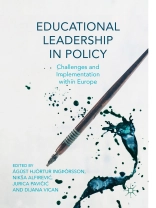This book analyzes the challenges of developing and implementing effective policies for educational leadership in South-East Europe (SEE) and the Nordic-Baltic region. While individual countries from the Nordic-Baltic region are praised for their educational achievements, the SEE region could be considered as a (post)transitional landscape: these two educational contexts present their own unique challenges, notably international benchmarking and the ‘Europeization’ of educational policy. Seamlessly integrating theoretical framework with the goals and experiences of actors and practitioners, the editors and contributors build an accessible overview of existing policy research and its conflicting theoretical perspectives. Often disregarded by the mainstream literature, the countries and regions chosen provide a snapshot into the challenges of developing policies for educational leadership. This thoughtful yet practical volume will be of interest and value not only to students and scholars of educational leadership in these regions, but to practitioners and policy makers more widely.
Cuprins
Chapter 1. Introduction: Challenges of school leadership policies in the north-western and south-eastern regions of Europe.- PART I. CHALLENGES OF POLICY THEORY AND CONTEXT.- Chapter 2. Educational institutions and policies at the crossroads of ‘liberal’ and ‘critical’ theory influences.- Chapter 3. The role of international benchmarking in shaping educational policy in small European countries.- Chapter 4. Educational policies for school leadership in Europe: A comparative review.- Chapter 5. Selection, training/development and licensing of principals: A critical overview of policies.- PART II. CHALLENGES OF POLICY INCLUSIVENESS.- Chapter 6. Inclusive educational policy and the democratic context of educational leadership and management.- Chapter 7. Technology and educational leadership: The role of leaders vs. national educational policies.- Chapter 8. School principals and educational policies inclusive of students with disabilities and special needs: Comparative empirical research in Southern and South-East Europe.- PART III. CHALLENGES OF POLICY IMPLEMENTATION IN SMALL EUROPEAN COUNTRIES.- Chapter 9. Icelandic policy and experience in developing educational leadership and management.- Chapter 10. Lithuanian educational policy for school leadership.- Chapter 11. Hierarchical challenges in education: A competitive arena for daring principals.- Chapter 12. Policy borrowing and school system improvement through national school leadership development.- Chapter 13. Croatian policy and experience in developing educational leadership and management: Work in progress, or a failed experiment?.- Chapter 14. Professional ethics and educational management / leadership of Croatian principals.- Chapter 15. Educational management and leadership in Montenegro.- Chapter 16. An epilogue: Toward an integrative framework for educational management and leadership development in small European countries.
Despre autor
Ágúst Hjörtur Ingþórsson is Head of the Education and Culture Division at RANNIS (The Icelandic Centre for Research), Iceland.
Nikša Alfirević is Professor in the Faculty of Economics, Business and Tourism at the University of Split, Croatia, and Researcher at the Scientific Center of Excellence for School Effectiveness and Management, Croatia.
Jurica Pavičić is Professor at the University of Zagreb, Croatia and Principal Researcher at the Scientific Center of Excellence for School Effectiveness and Management, Croatia.
Dijana Vican is Professor at the Department of Education at the University of Zadar, Croatia.












